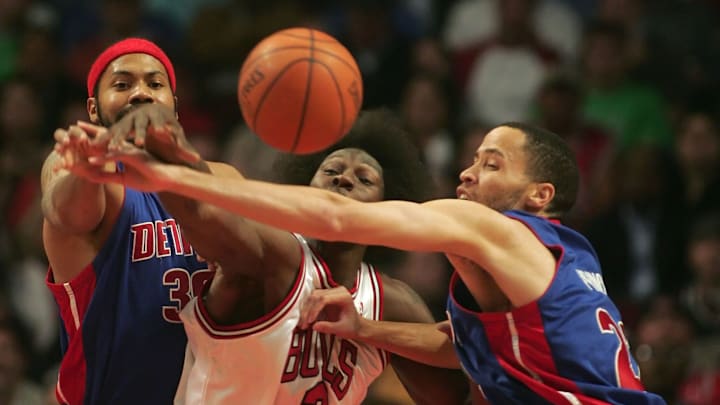The Detroit Pistons are no strangers to defense.
All three of their titles were won on the backs of some of the best team defenses the NBA has ever seen, something which seems almost impossible when you look at how the game has evolved since.
The league is on pace to have its highest scoring averages of all time, with five teams currently averaging over 120 points per game. There are 13 teams averaging at least 117, a huge leap from just last season when there was one team averaging 120+ and six teams hitting the 117 mark.
Part of this explosion is that players are getting better and better offensively, but a lot of it is 3-point shooting, as teams are finding more ways to get efficient shots from long range.
All 30 teams in the NBA are now chucking at least 30 attempts per game from 3-point range, which would have been unthinkable back when the Goin' to Work team was dominating. Just 20 years ago, there wasn't a single team in the NBA shooting 30 from 3-point range per game. OKC led the league with 23.6 attempts and the Detroit Pistons were taking just 12.3 attempts from long range, a stat we now sometimes see from a single player.
Detroit is shooting 31.1 per game this season, nearly three times the number they did in 2004 and they are currently just 28th in the league in attempts. So the game has changed.
But the rules and the way the game is called have all changed in favor of offensive players, something that executive vice president and head of basketball operations Joe Dumars says the league will look at in the offseason.
Here are some ideas for how to make the game more equitable for the defender.
Get rid of the defensive 3-second rule
According to the NBA, the defensive 3-second rule is when "Any defensive player, who is positioned in the 16-foot lane or the area extending 4 feet past the lane endline, must be actively guarding an opponent within three seconds. Actively guarding means being within arm’s length of an offensive player and in a guarding position."
This rule makes it easier to open up space with back screens and often forces bigs to follow players cutting through the lane to avoid violating the rule.
It likely wouldn't make a big difference, but defenders should be able to play wherever they want, to stay on the strong side where the action is and not have to stay near players who aren't involved directly with the play.
Touch fouls on the perimeter
One thing that has always bugged me is how post players are allowed to beat the crap out of each other with impunity, while perimeter players are often gifted with touch fouls that didn't affect the shot.
The league tried to clean up closeouts where defenders get under the shooter, which was good, as those plays can be dangerous and have caused injuries.
But referees need to do a better job of allowing defenders to go straight up and need to ignore incidental contact, especially on 3-point shots.
Call the offensive flop
The NBA has said time and time again that they want to clean up flopping on both ends, but there's been little evidence of it. Offensive players are often rewarded for falling on the ground after shots even though the replays show there wasn't enough contact to knock over a feather teetering on the tip of a needle.
While they've made progress in stopping the Trae Young special (stopping in front of a defender to get purposely run over), you still see it called occasionally.
Same with the James Harden head flop as I call it, where players throw their heads back as if they've just been slammed by a hook from prime Mike Tyson.
It's not part of the game, and referees need to stop rewarding this nonsense with free throws.
Review calls for star players
The Detroit Pistons have been the victim of some terrible officiating this season and Cade Cunningham gets fewer calls than any star player in the league.
This one will be much more difficult, as refs have always gifted stars with favorable calls and the best players are often very good at drawing them.
But when one player shoots more free throws than the entire other team, obviously something is askew, just ask the LA Lakers, who have shot hundreds more free throws than their opponents this season and led the league in attempts last year while giving up the fewest, a testament to the persuasiveness of LeBron James and Anthony Davis.
Stars are also allowed to argue calls with much more fervor than young guys, who get T'd up at the slightest hint they are displeased with the call.
I'm sure there are other ways the NBA can add some element of defense back to the games (calling the regular season like they do the playoffs would be a start) and they need to, as the scores are looking more like All-Star games and there are more blowouts than ever.
